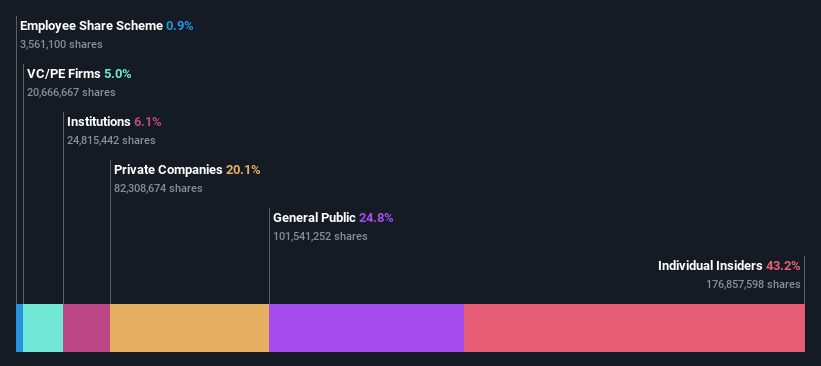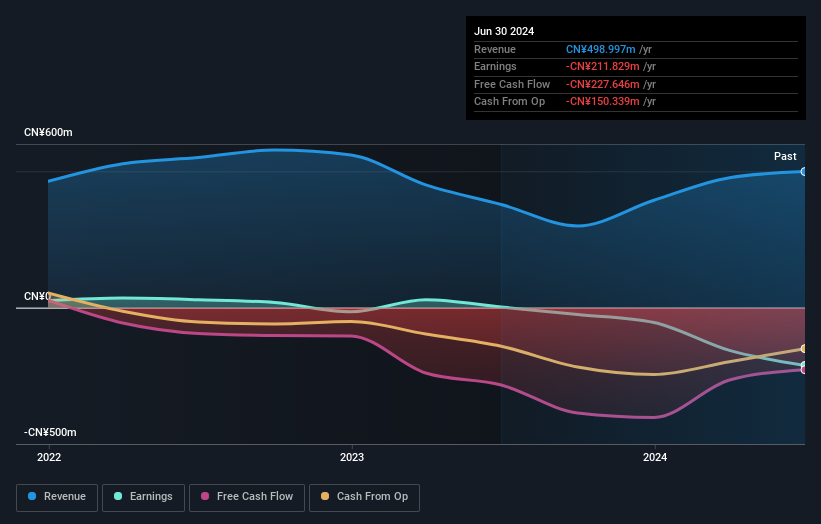- China
- /
- Semiconductors
- /
- SHSE:688173
The recent 10% gain must have brightened CEO Hai Tao's week, Halo Microelectronics Co., Ltd.'s (SHSE:688173) most bullish insider

Key Insights
- Significant insider control over Halo Microelectronics implies vested interests in company growth
- 52% of the business is held by the top 4 shareholders
- Ownership research, combined with past performance data can help provide a good understanding of opportunities in a stock
If you want to know who really controls Halo Microelectronics Co., Ltd. (SHSE:688173), then you'll have to look at the makeup of its share registry. The group holding the most number of shares in the company, around 43% to be precise, is individual insiders. That is, the group stands to benefit the most if the stock rises (or lose the most if there is a downturn).
As a result, insiders scored the highest last week as the company hit CN¥3.7b market cap following a 10% gain in the stock.
In the chart below, we zoom in on the different ownership groups of Halo Microelectronics.
View our latest analysis for Halo Microelectronics

What Does The Institutional Ownership Tell Us About Halo Microelectronics?
Many institutions measure their performance against an index that approximates the local market. So they usually pay more attention to companies that are included in major indices.
As you can see, institutional investors have a fair amount of stake in Halo Microelectronics. This implies the analysts working for those institutions have looked at the stock and they like it. But just like anyone else, they could be wrong. If multiple institutions change their view on a stock at the same time, you could see the share price drop fast. It's therefore worth looking at Halo Microelectronics' earnings history below. Of course, the future is what really matters.

We note that hedge funds don't have a meaningful investment in Halo Microelectronics. Looking at our data, we can see that the largest shareholder is the CEO Hai Tao with 23% of shares outstanding. With 14% and 9.2% of the shares outstanding respectively, Ya Tang and Chongqing Weichun Enterprise Management Consulting Co., Ltd. are the second and third largest shareholders. Interestingly, the second-largest shareholder, Ya Tang is also Chief Financial Officer, again, pointing towards strong insider ownership amongst the company's top shareholders.
To make our study more interesting, we found that the top 4 shareholders control more than half of the company which implies that this group has considerable sway over the company's decision-making.
While studying institutional ownership for a company can add value to your research, it is also a good practice to research analyst recommendations to get a deeper understand of a stock's expected performance. As far as we can tell there isn't analyst coverage of the company, so it is probably flying under the radar.
Insider Ownership Of Halo Microelectronics
The definition of company insiders can be subjective and does vary between jurisdictions. Our data reflects individual insiders, capturing board members at the very least. The company management answer to the board and the latter should represent the interests of shareholders. Notably, sometimes top-level managers are on the board themselves.
Most consider insider ownership a positive because it can indicate the board is well aligned with other shareholders. However, on some occasions too much power is concentrated within this group.
Our most recent data indicates that insiders own a reasonable proportion of Halo Microelectronics Co., Ltd.. Insiders have a CN¥1.6b stake in this CN¥3.7b business. This may suggest that the founders still own a lot of shares. You can click here to see if they have been buying or selling.
General Public Ownership
With a 25% ownership, the general public, mostly comprising of individual investors, have some degree of sway over Halo Microelectronics. While this size of ownership may not be enough to sway a policy decision in their favour, they can still make a collective impact on company policies.
Private Equity Ownership
Private equity firms hold a 5.0% stake in Halo Microelectronics. This suggests they can be influential in key policy decisions. Some might like this, because private equity are sometimes activists who hold management accountable. But other times, private equity is selling out, having taking the company public.
Private Company Ownership
Our data indicates that Private Companies hold 20%, of the company's shares. It's hard to draw any conclusions from this fact alone, so its worth looking into who owns those private companies. Sometimes insiders or other related parties have an interest in shares in a public company through a separate private company.
Next Steps:
It's always worth thinking about the different groups who own shares in a company. But to understand Halo Microelectronics better, we need to consider many other factors. For instance, we've identified 2 warning signs for Halo Microelectronics (1 makes us a bit uncomfortable) that you should be aware of.
Of course this may not be the best stock to buy. So take a peek at this free free list of interesting companies.
NB: Figures in this article are calculated using data from the last twelve months, which refer to the 12-month period ending on the last date of the month the financial statement is dated. This may not be consistent with full year annual report figures.
Valuation is complex, but we're here to simplify it.
Discover if Halo Microelectronics might be undervalued or overvalued with our detailed analysis, featuring fair value estimates, potential risks, dividends, insider trades, and its financial condition.
Access Free AnalysisHave feedback on this article? Concerned about the content? Get in touch with us directly. Alternatively, email editorial-team (at) simplywallst.com.
This article by Simply Wall St is general in nature. We provide commentary based on historical data and analyst forecasts only using an unbiased methodology and our articles are not intended to be financial advice. It does not constitute a recommendation to buy or sell any stock, and does not take account of your objectives, or your financial situation. We aim to bring you long-term focused analysis driven by fundamental data. Note that our analysis may not factor in the latest price-sensitive company announcements or qualitative material. Simply Wall St has no position in any stocks mentioned.
About SHSE:688173
Halo Microelectronics
Engages in the design, development, and sale of analog and power management integrated circuit products worldwide.
Flawless balance sheet very low.


